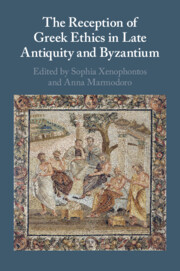Book contents
- The Reception of Greek Ethics in Late Antiquity and Byzantium
- The Reception of Greek Ethics in Late Antiquity and Byzantium
- Copyright page
- Contents
- Tables
- Contributors
- Acknowledgements
- Abbreviations
- Introduction
- Part I Ethics across the Late-antique and Byzantine Period
- Chapter 1 Sexual Difference and the Difference It Makes
- Chapter 2 Ethics and the Hierarchy of Virtues from Plotinus to Iamblichus
- Chapter 3 Neoplatonic Contemplative Ethics
- Chapter 4 Ethics, Virtue and Theurgy
- Chapter 5 Imitation and Self-Examination
- Chapter 6 The Reception of Greek Ethics in Christian Monastic Writings
- Chapter 7 Understanding Self-Determination and Moral Selfhood in the Sources of Late-antique and Byzantine Christian Thought
- Chapter 8 ‘Singing with David and Contemplating Agesilaus’
- Part II Prominent Ethical Views of the Time
- Bibliography
- Index Locorum
- Index of Names and Subjects
Chapter 2 - Ethics and the Hierarchy of Virtues from Plotinus to Iamblichus
from Part I - Ethics across the Late-antique and Byzantine Period
Published online by Cambridge University Press: 15 June 2021
- The Reception of Greek Ethics in Late Antiquity and Byzantium
- The Reception of Greek Ethics in Late Antiquity and Byzantium
- Copyright page
- Contents
- Tables
- Contributors
- Acknowledgements
- Abbreviations
- Introduction
- Part I Ethics across the Late-antique and Byzantine Period
- Chapter 1 Sexual Difference and the Difference It Makes
- Chapter 2 Ethics and the Hierarchy of Virtues from Plotinus to Iamblichus
- Chapter 3 Neoplatonic Contemplative Ethics
- Chapter 4 Ethics, Virtue and Theurgy
- Chapter 5 Imitation and Self-Examination
- Chapter 6 The Reception of Greek Ethics in Christian Monastic Writings
- Chapter 7 Understanding Self-Determination and Moral Selfhood in the Sources of Late-antique and Byzantine Christian Thought
- Chapter 8 ‘Singing with David and Contemplating Agesilaus’
- Part II Prominent Ethical Views of the Time
- Bibliography
- Index Locorum
- Index of Names and Subjects
Summary
The present chapter aims to show the connection between the ethical views of early Neoplatonist philosophers (Plotinus, Porphyry, Iamblichus) and their metaphysical doctrines concerning the hierarchy of being. In the first section, it is argued that Plotinus focuses on virtues within the framework of a discussion about how the embodied soul can revert to the intelligible god (Enn. 1.2(19)). According to Plotinus the intelligible god has no virtues: there are paradigms of virtues in the Intellect, but these are not the virtues themselves. This is consistent with Plotinus’ view that different levels in the hierarchy of being are heterogeneous and do not share the same properties. Plotinus’ approach makes the status of political virtues problematic. Sections two and three focus on Porphyry and Iamblichus respectively. Their arrangements of the levels of virtues are connected to their accounts of the hierarchy of being, which are different both from that of Plotinus and from each other. Porphyry’s account in Sent. 32 is based on the idea that the cause pre-contains what depends on it (hence Porphyry’s emphasis on paradigmatic virtues). Iamblichus’ account seems to rely on his view that different levels in the hierarchy are connected via analogy.
- Type
- Chapter
- Information
- Publisher: Cambridge University PressPrint publication year: 2021
- 3
- Cited by

